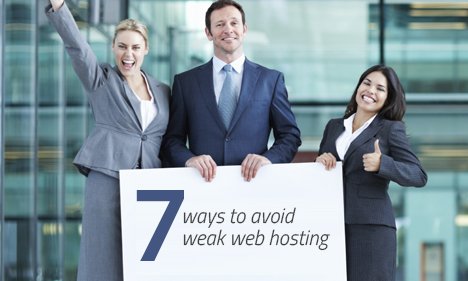7 ways to avoid shoddy web hosting
Henry Ford once said a good team needs to “pull together and lift together”. It’s a phrase that continues to ring true. Whether you’re working with inhouse colleagues or third party providers such as a web host, the wrong person or party can lead to endless misery and destroy a business.
Here are 7 ways to avoid web hosting pain:
#1 Fast forward ~
What your business needs now may not be what it needs in the future, so think ahead. Do you have sufficient disk space, or enough bandwidth to grow? If your marketing activity increases and starts to include a lot of software, audio or video downloads, you may end up using more bandwidth than your plan allows. In worst case scenarios this can lead to your website being shut~down.
#2 Up and running
Uptime is critical and your website(s) need to be open for business even when you’re fast asleep in bed. That said, don’t be fooled by web hosting companies promising 100% uptime – look instead for 99.7%-99.9%. You should also read the T&Cs of the uptime agreement as some hosting companies exclude downtime resulting from maintenance and other issues, making it questionable how reliable a guarantee is.
#3~Cheap and cheerful~
If something’s cheap, it’s usually cheap for a reason. That said, competition is rife within the world of web hosting so getting a good deal isn’t hard. Bear in mind that budget plans may include a more limited range of services such as~insufficient bandwidth which can cause hours of hair-pulling frustration if, for instance, you get a sudden peak in traffic that demands more bandwidth. Cheap hosting may also see you receive lower levels of support. There are various tools enabling you to calculate bandwidth including this one from Find My Host.
#4 Fast and flawless~
The speed at which webpages load affects~visitor engagement, retention and conversion and can have a signicant effect on your business and page rank. Google’s guide on how to Improve Server Response Time helps you see whether the problems lie with the web design or web host. Its new Page Insights also enables you to do a quick test to see how your own site functions on mobiles and desktops. Site24x7 monitoring takes this further by monitoring web applications and performance globally, round-the-clock.
#5 Customer care
There’s nothing quite like a friendly voice on the other end of the line or speedy ‘live chat’ response when you need a problem resolved. Therefore seek out hosts able to offer 24/7 telephone support preferably toll free, quick email response times and live chat. You can compare the performance of hosting providers by monitoring up to 5 website for free with the Site24x7 Free Plan
#6 Safe and secure
Your customers need utmost confidence to do business with you, especially if it involves passing over their credit card details to you online. SSL (Secure Sockets Layer) is crucial for any ecommerce site, leaving customers less susceptible to credit card fraud and identity theft. Make sure your web host can provide an SSL secure server otherwise you’ll not only run the risk of compromising your customer’s security but lose business. Some customers will refuse to shop with you unless they see the SSL Certificate.
Last but by no means least is a disaster recovery plan, or DRP. These three little words tell you the measures the host has in place to protect your business from a disaster. For instance, what happens if a server rack tips over or a server’s hacked? Knowing your web host can handle manmade and natural disasters~such as a power~cut will not only help you feel secure and protected. It may also protect you from a major fall.
